
|
The world of non-commercial film and A-V |
Events Diary | Search | ||
| The Film and Video Institute | | ||||
To BIAFF 2011 results | To Full Making Of Index
Montague Jack won The making of MONTAGUE JACK part one |
|
 |
As chairman of Wimborne Minster Cine & Video Club (WMCVC) for several years I had been looking for a major project for the club that broadly fulfilled two criteria. First priority: the film had to utilise and stretch the talents of our membership and involve as many people as possible. We have around 50 members and like many clubs produce the usual selection of documentaries, holiday films and occasional drama. We needed to think outside the box. Second priority: to produce a movie that was relevant to our local community. Over the years WMCVC have produced various films in and around Wimborne, which is an ancient Dorset town steeped in history. Also, our local council has been most supportive in helping us to get National Lottery and District Council funds to re-furbish our clubhouse. |
|
|
A local event featuring the town's history highlighted that Montague John Druitt, one of the principal suspects in the notorious "Jack the Ripper" murders of the 1880's. was in fact born and raised in Wimborne not five minutes from our clubhouse in the centre of town. A quick Google search revealed a wealth of information and we were up and running. Also one of our members John Perry, an ex- Mayor of the town was a local history buff and Druitt enthusiast. He and I began to compile our research.
It became obvious from the start that the project would require planning,
planning and more planning if we were to succeed. The process that followed
broke down into the following areas:
|
|
Committee approval, budgeting and setting the project team up ... |
|
Once I had the basic idea set out (on a single A4 page) the committee was approached and a budget of £1,500 for filming was agreed. This was based on an estimate of costume hire, some venue costs and a contingency sum. The project would be filmed using a single HDV camera, a Canon XL H1 and edited on Final Cut Pro. At one of our regular Friday meetings all interested club members were invited to attend a meeting to hear about the project in detail and volunteer to take part if they wished, the idea being to involve as many people as possible. It soon became apparent that we had three groups:
|
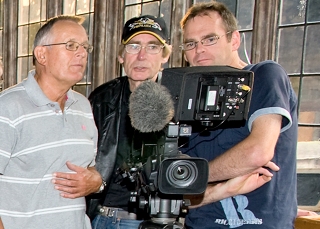 |
The lead filming team was: |
|
Peter Hale - our Director of Photography. |
Carl Appleby and Eric Montague - cameramen. |
Neil Horder - sound and Bill Horseman - lighting and
electrics. |
Terry Hopwood - general factotum. |
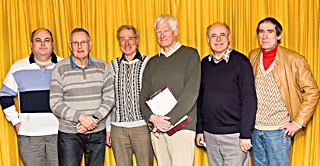 |
Trevor Guess - "making of the film". |
These were just the core team. Throughout filming they were aided and abetted by some 20 or so members as and when required. By keeping the core team reasonably fairly small it was much easier with each member taking overall responsibility for his own part of the project |
Research and scripting ... |
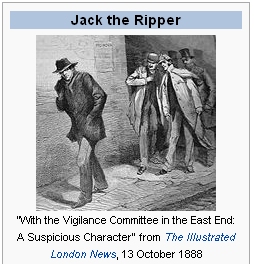 |
The volume of data available on "Jack the Ripper" is quite overwhelming with the Internet, books, DVD's and academic papers all covering the subject. We agreed John Perry would examine available local history and I would scour the Internet, read as many books and watch as many DVD's as possible. This process took the best part of a year. Sadly in September 2007 John Perry passed away after a short illness. This left a huge void, as John had been a driving force and an inspiration to us all. We decided to dedicate the film to him. At this point we had not decided the structure of the film: a straightforward club documentary or, as had been suggested by one member a drama/documentary? If it were to involve dramatisation two further problems were created: |
Firstly - we needed a fully developed script with good dialogue.
Secondly - finding suitable actors. |
We also had one further decision. How to link the documentary elements with the drama? |
|
Michael although now retired is a highly experienced Film and Television actor and also a producer with a host of credits to his name. We went to lunch and I explained the project to him. I was quite nervous because although I knew Michael socially, I did not know how he would react to being asked to take part with a load of amateurs! I need not have worried. He was on board. He agreed not only to take part but also keep an eye on my script and act as mentor to our actors as and when required. |
|
Scripting was then the main focus.A structure for the video was decided and we worked on the various elements: narrator and link material, montage sequences and of course the all important dramatised scenes. To help I used a shareware programme called Celtex which allows the co-ordination of everything required for the project. Not having experience in writing dialogue I viewed as many costume dramas set in the period as possible; and developed a style that I thought appropriate for the material. The draft scripts were discussed with Michael and Jeremy Austin a member of Wimborne Drama. I think that there were about nine drafts before we settled on one we were happy with.
|
Planning / Casting / Locations / Rehearsals / Shooting and Post Production
... go to part two ...
Share your passions.
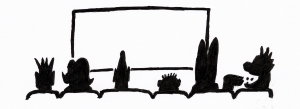
Share your stories.
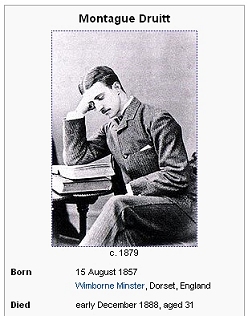
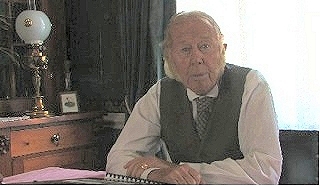 We
decided to use a central narrator, who would appear as Frederick
Abberline, the lead police officer in the hunt for "Jack the Ripper".
Who should play the part? The solution was obvious. Our President Michael
Medwin.
We
decided to use a central narrator, who would appear as Frederick
Abberline, the lead police officer in the hunt for "Jack the Ripper".
Who should play the part? The solution was obvious. Our President Michael
Medwin.
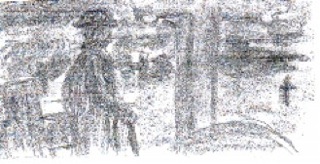 Storyboards - each sequence was discussed with Peter
Hale and he began work on the storyboards. This was a vital part of the project
as it enabled us to visualise every shot and iron out problems right from
the word go and was the first step of the detailed planning that was to follow.
In the end there were some 460 sketches that were all scanned into the Celtex
programme and linked to each scene in the script.
Storyboards - each sequence was discussed with Peter
Hale and he began work on the storyboards. This was a vital part of the project
as it enabled us to visualise every shot and iron out problems right from
the word go and was the first step of the detailed planning that was to follow.
In the end there were some 460 sketches that were all scanned into the Celtex
programme and linked to each scene in the script.